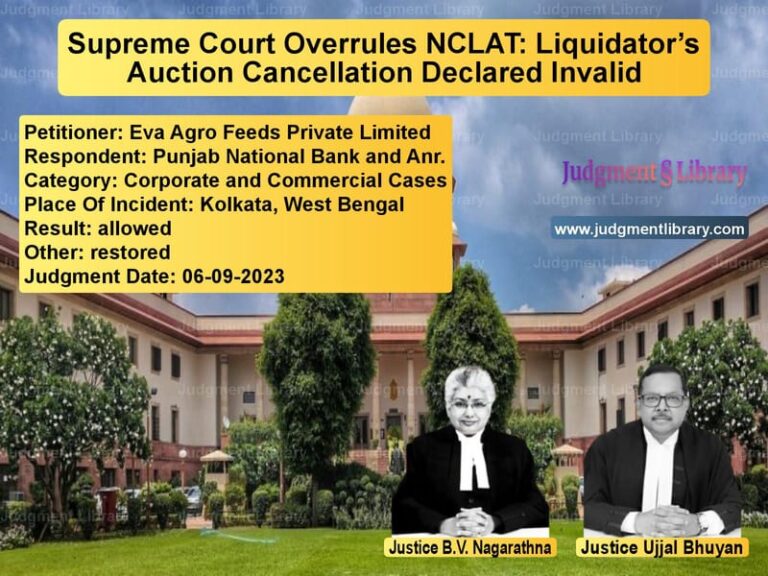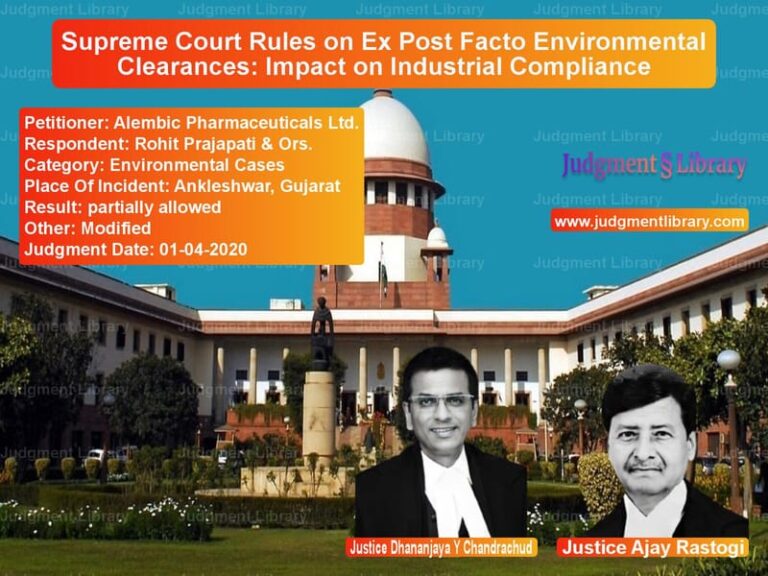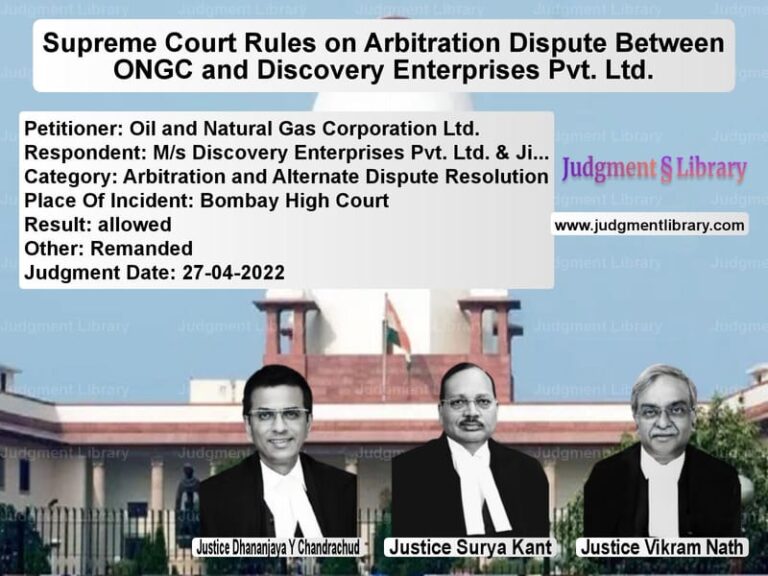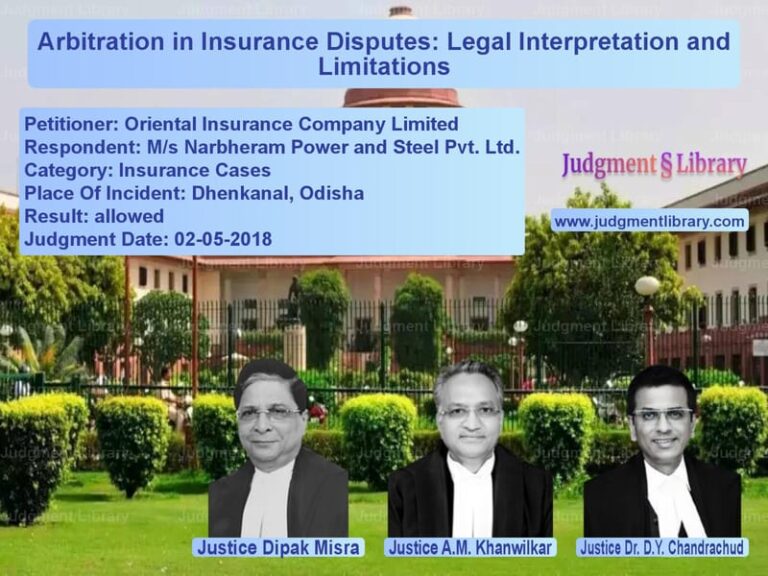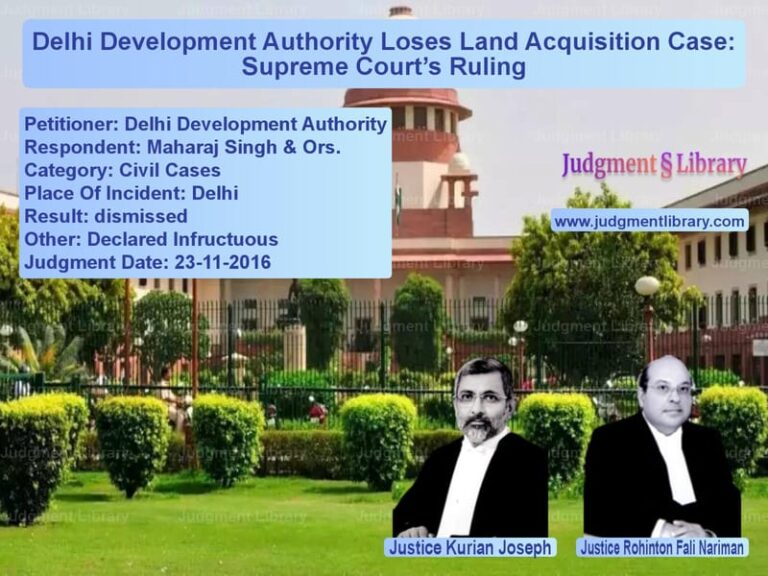Hindu Succession and Adoption: Supreme Court’s Landmark Judgment on Property Rights
The case of Saheb Reddy vs. Sharanappa and Others is a landmark judgment delivered by the Supreme Court of India on November 16, 2016. This case revolves around the interpretation of property rights under the Hindu Succession Act, 1956 and the Hindu Adoptions and Maintenance Act, 1956. The central issue in this case was whether an adopted son could claim exclusive ownership of ancestral property, despite the fact that it had already vested in other heirs before his adoption.
Background of the Case
The dispute arose following the death of Sharnappa Gaded, the original owner of the property, who passed away intestate in 1957. He was survived by his widow, Smt. Sharnappa, and three daughters. The plaintiff, Sharanappa, was the grandson of the deceased and filed a suit seeking partition of the family property, arguing that he was entitled to a share.
On the other hand, the defendant, Saheb Reddy, claimed exclusive ownership of the property on the basis that he was legally adopted by Smt. Sharnappa in 1971. He argued that as the adopted son, he inherited the entire property of his adoptive mother, thereby negating any claims made by the daughters or their heirs.
Legal Issues Considered
- Did the adoption of a son in 1971 affect the inheritance rights of legal heirs when the property was already vested in them in 1957?
- How should the property be divided according to the Hindu Succession Act, 1956?
- Was the Karnataka High Court justified in overturning the first appellate court’s ruling?
Arguments Presented
Appellant (Saheb Reddy) Arguments:
- The adoption was valid and was evidenced by a registered adoption deed dated February 9, 1971.
- As an adopted son, he inherited all the property of his adoptive mother.
- He had been in possession of the property for over 34 years and should be recognized as its rightful owner.
- His ownership was legally protected due to adverse possession.
Respondent (Sharanappa and Others) Arguments:
- The property had already vested in the widow and daughters of Sharnappa Gaded in 1957, long before the adoption of Saheb Reddy in 1971.
- Under Section 12 of the Hindu Adoptions and Maintenance Act, an adopted child “shall not divest any person of any estate which vested in him or her before the adoption.”
- The property of the widow should be divided among all her legal heirs, including the children of her deceased daughters.
Supreme Court’s Observations
The Supreme Court extensively analyzed Section 12 of the Hindu Adoptions and Maintenance Act, which states:
“The adopted child shall not divest any person of any estate which vested in him or her before the adoption.”
The Court ruled that since the property had already vested in the widow and daughters of Sharnappa Gaded in 1957, the adoption of Saheb Reddy in 1971 could not legally impact the inheritance rights of other legal heirs.
Final Judgment
The Supreme Court ruled as follows:
- The Karnataka High Court erred in overturning the first appellate court’s ruling.
- The property must be partitioned among all legal heirs in accordance with the Hindu Succession Act.
- The adopted son (Saheb Reddy) was entitled to a share but could not claim exclusive ownership.
- The first appellate court’s judgment was restored.
The appeal was allowed with no order as to costs.
Impact of the Judgment
The Supreme Court’s ruling in this case has several important implications:
- It establishes that an adopted son cannot take away property from other heirs if the property was already inherited before his adoption.
- It clarifies that property must be divided as per the Hindu Succession Act, ensuring fair distribution.
- It upholds the inheritance rights of daughters and their children.
Conclusion
This Supreme Court judgment reinforces the principle that adoption does not disrupt inheritance rights of existing heirs. It ensures fair distribution of ancestral property, protects legal heirs from being unfairly deprived of their inheritance, and upholds the rule of law in matters of Hindu succession.
Don’t miss out on the full details! Download the complete judgment in PDF format below and gain valuable insights instantly!
Download Judgment: Saheb Reddy vs Sharanappa and Other Supreme Court of India Judgment Dated 16-11-2016.pdf
Direct Downlaod Judgment: Direct downlaod this Judgment
See all petitions in Succession and Wills
See all petitions in Property Disputes
See all petitions in Landlord-Tenant Disputes
See all petitions in Judgment by Anil R. Dave
See all petitions in Judgment by L. Nageswara Rao
See all petitions in allowed
See all petitions in supreme court of India judgments November 2016
See all petitions in 2016 judgments
See all posts in Civil Cases Category
See all allowed petitions in Civil Cases Category
See all Dismissed petitions in Civil Cases Category
See all partially allowed petitions in Civil Cases Category


